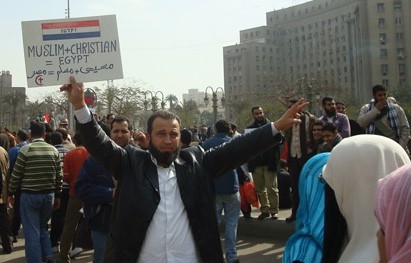Muslims and Copts together: Egypt’s interfaith revolution

Unlike the other Middle Eastern countries experiencing popular uprisings, Egypt has a significant indigenous historic Christian presence, and Christians make up about 10 percent of the population. Perhaps one of the chief ramifications of the protests that overthrew Egyptian president Hosni Mubarak was the way religious divisions were set aside in the process.
The groundwork for the interfaith element of the protests was laid after a bomb exploded on New Year's Eve outside a prominent Coptic church in Alexandria. Twenty-three people were killed instantly and more than 90 were seriously wounded. While this act of terrorism was meant to spark increased sectarian tension, it instead led to a movement throughout Egypt in which Muslims expressed their sorrow to Christians. Six days later, when Coptic Christians across the country celebrated Christmas, thousands of Muslims attended the services with them to show their solidarity. At church after church, Muslims formed human chains of protection around the buildings so their Christian brothers and sisters could observe their Christmas Eve mass in safety.
As a direct result of the bombing, millions of Egyptians replaced their Facebook profile photos with the image of a cross within a crescent. In the streets, posters and bumper stickers were passed out all over Cairo and Alexandria showing the cross and crescent next to each other—often with the crescent embracing the cross—along with the phrase, "We are all Egyptians." Three weeks later, when young Muslims and Christians took to the streets in antigovernment protests, this interfaith solidarity was still evident.




